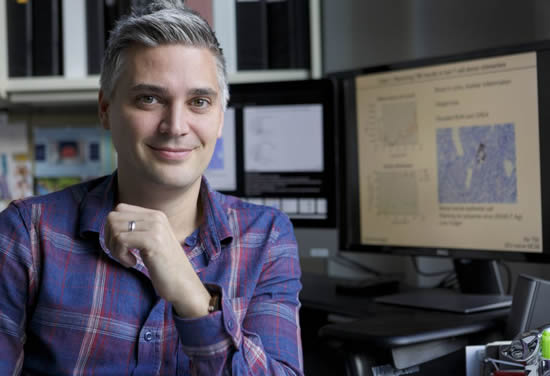
|
RESEARCH NEWS
Monoclonal antibody prevents HIV infection in monkeys, study finds
Leronlimab to be studied as potential HIV PrEP drug in an early human clinical trial
By Franny White
 A Nature Communications paper co-led by Jonah Sacha, Ph.D., at OHSU's Oregon National Primate Research Center and Vaccine & Gene Therapy Institute (shown here) and Lishomwa Ndhlovu, M.D., Ph.D., of Weill Cornell Medicine describes how the monoclonal antibody leronlimab can completely prevent nonhuman primates from being infected with the monkey form of HIV. (OHSU/Kristyna Wentz-Graff)
A Nature Communications paper co-led by Jonah Sacha, Ph.D., at OHSU's Oregon National Primate Research Center and Vaccine & Gene Therapy Institute (shown here) and Lishomwa Ndhlovu, M.D., Ph.D., of Weill Cornell Medicine describes how the monoclonal antibody leronlimab can completely prevent nonhuman primates from being infected with the monkey form of HIV. (OHSU/Kristyna Wentz-Graff)
Portland, Oregon - June 7, 2021— An experimental, lab-made antibody can completely prevent nonhuman primates from being infected with the monkey form of HIV, new research published in Nature Communications shows.
 Jonah Sacha, Ph.D. Jonah Sacha, Ph.D.
The results will inform a future human clinical trial evaluating leronlimab as a potential pre-exposure prophylaxis, or PrEP, therapy to prevent human infection from the virus that causes AIDS.
“Our study findings indicate leronlimab could be a new weapon against the HIV epidemic,” said the study’s lead researcher and co-corresponding author of this paper, Jonah Sacha, Ph.D., an Oregon Health & Science University professor at OHSU’s Oregon National Primate Center and Vaccine & Gene Therapy Institute.
 Lishomwa Ndhlovu, M.D., Ph.D. Lishomwa Ndhlovu, M.D., Ph.D.
“The results of this pre-clinical study, targeting the HIV co-receptor CCR5, have the potential to be groundbreaking as we essentially have a tool that can mimic the genetic mutations of CCR5 that render some individuals immune to infection and have led in part to two cases of a cure of HIV,” said the other co-corresponding author, Lishomwa Ndhlovu, M.D., Ph.D., a professor of immunology in medicine at Weill Cornell Medicine in New York.
Made by Vancouver, Washington-based CytoDyn, the monoclonal antibody blocks HIV from entering immune cells through a surface protein called CCR5. The injectable drug has already been studied in a Phase 3 trial as a potential treatment for people living with HIV when used in combination with standard antiretroviral medications. CytoDyn is in the process of submitting information to the FDA to request its approval for that use. This study, however, specifically examined preventing HIV infection to begin with.
Some PrEP drugs are already available, but they can lead to adverse side effects such as liver, heart and bone problems, and some people are resistant to them due to genetic mutations in HIV. Existing PrEP options typically require frequent use, such as a pill daily, or are infusions that must be given in a clinic. Leronlimab is designed to be a self-administered injection.
To study leronlimab’s effectiveness as a potential PrEP drug, the research team created three groups of six rhesus macaques at OHSU’s Oregon National Primate Research Center. Two groups received different doses of leronlimab, while the third served as a control that didn’t receive the experimental drug.
Macaques that received the higher dose of 50 milligrams per kilogram of the animal’s weight every other week were completely protected from the monkey form of HIV. In contrast, two of the animals that received the lower dose of 10 milligrams per kilogram per week became infected, and every animal in the control group became infected. Researchers concluded the low-dose group’s partial protection was likely due to monkey immune responses against the human antibody.
Following this study’s results, CytoDyn is planning to conduct an early clinical trial investigating leronlimab as a potential PrEP drug in people within the next year. Human doses would likely be lower than those given in this study, as rhesus macaque cells have more surface CCR5 protein than humans.
In the meanwhile, Sacha is already trying to make leronlimab easier to use. He received a five-year, $3-million NIH grant in August 2020 to develop a concentrated, longer-lasting formulation of leronlimab that could allow it to be injected every three months. Less-frequent injections can increase drug regimen adherence, and therefore improve drug effectiveness.
The research team dedicated this study to Timothy Ray Brown, who died Sept. 29, 2020, and was known as the Berlin patient for being the first person to be cured of HIV. While living in Berlin in 2007, Brown underwent a bone morrow transplant to treat his blood cancer. The procedure eliminated HIV in Brown because the transplanted bone marrow came from a donor who had a rare mutation that eliminated the CCR5 gene, which makes the surface protein through which HIV enters cells. Sacha became friends with Brown after meeting him at an AIDS conference in 2015. Brown is also a co-author on the paper, and inspired scientists working on this research.
REFERENCE: Xiao L. Chang, Gabriela M. Webb, Helen L. Wu, Justin M. Greene, Shaheed Abdulhaqq, Kathrine B. Bateman, Jason S. Reed, Cleiton Pessoa, Whitney C. Weber, Nicholas Maier, Glen M. Chew, Roxanne M. Gilbride, Lina Gao, Rebecca Agnor, Travis Giobbi, Jeffrey Torgerson, Don Siess, Nicole Burnett, Miranda Fischer, Oriene Shiel, Cassandra Moats, Bruce Patterson, Kush Dhody, Scott Kelly, Nader Pourhassan, Diogo M. Magnani, Jeremy Smedley, Benjamin N. Bimber, Nancy L. Haigwood, Scott G. Hansen, Timoty R. Brown, Lishomwa C. Ndhlovu, Jonah B. Sacha, Antibody-based CCR5 Blockade Protects Macaques from Mucosal SHIV Transmission, Nature Communications, June 7, 2021, DOI: 10.1038/s41467-021-23697-6, https://www.nature.com/articles/s41467-021-23697-6.
This research was supported by the National Institute of Allergy and Infectious Diseases (grants R01 AI129703, R01 AI54559, R21 AI54559, K01 OD026561, U24 AI126683) and the National Institutes of Health’s Office of the director (Oregon National Primate Research Center Core grant P51 OD011092).
In our interest of ensuring the integrity of our research and as part of our commitment to public transparency, OHSU actively regulates, tracks and manages relationships that our researchers may hold with entities outside of OHSU. In regards to this research, Jonah Sacha has a significant financial interest in CytoDyn, a company that may have a commercial interest in the results of this research and technology. Additionally, Dr. Lishomwa Ndhlovu receives an annual stock option grant to purchase CytoDyn common stock as a member of CytoDyn’s Scientific Advisory Board.
###
Contact:
Franny White (she/her)
Senior Media Relations Specialist
OHSU | Oregon Health & Science University
Source: https://news.ohsu.edu/2021/06/07/monoclonal-antibody-prevents-hiv-infection-in-monkeys-study-finds
"Reproduced with permission - "OHSU | Oregon Health & Science University"
OHSU | Oregon Health & Science University
For more HIV and AIDS News visit...
Positively Positive - Living with HIV/AIDS:
HIV/AIDS News
|